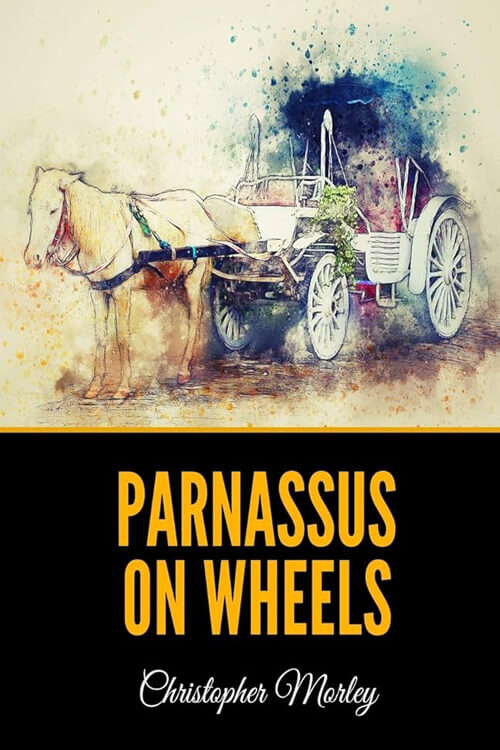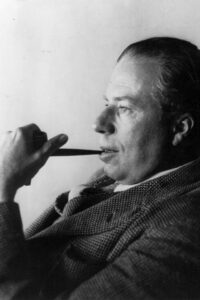
Parnassus on Wheels
I wonder if there isn’t a lot of bunkum in higher education. I never found that people who learned logarithms and other kinds of poetry were any quicker in washing dishes or darning socks. I’ve done a good deal of reading when I could, and I don’t want to “admit impediments” to the love of books, but I’ve also seen lots of good, practical folk spoiled by too much fine print. Reading sonnets always gives me hiccups, too.
I never expected to be an author! But I do think there are some amusing things about the story of Andrew and myself and how books broke up our placid life. When John Gutenberg, whose real name (so the Professor says) was John Gooseflesh, borrowed that money to set up his printing press he launched a lot of troubles in the world.
Andrew and I were wonderfully happy on the farm until he became an author. If I could have foreseen all the bother his writings were to cause us, I would certainly have burnt the first manuscript on the kitchen stove.
Andrew McGill, the author of those books everyone reads, is my brother. In other words, I am his sister, ten years younger. Years ago Andrew was a businessman, but his health failed and, like so many people in the story books, he fled to the country, or, as he called it, to the bosom of Nature. He and I were the only ones left in an unsuccessful family. I was slowly perishing as a conscientious governess in the brownstone region of New York. He rescued me from that and we bought a farm with our combined savings. We became real farmers, up with the sun and to bed with the same. Andrew wore overalls and a soft shirt and grew brown and tough. My hands got red and blue with soapsuds and frost; I never saw a Redfern advertisement from one year’s end to another, and my kitchen was a battlefield where I set my teeth and learned to love hard work. Our literature was on government agriculture reports, patent medicine almanacs, seedsmen’s booklets, and Sears Roebuck catalogs. We subscribed to Farm and Fireside and read the serials aloud. Now and then, for real excitement, we read something stirring in the Old Testament—that cheery book Jeremiah, for instance, of which Andrew was very fond. The farm did prosper, after a while; and Andrew used to hang over the pasture bars at sunset, and tell, from the way his pipe burned, just what the weather would be the next day.
Read or download Book
Christopher Morley
Christopher Darlington Morley (May 5, 1890 – March 28, 1957) was an American journalist, novelist, essayist and poet. He also produced stage productions for a few years and gave college lectures.
Biography
Morley was born in Bryn Mawr, Pennsylvania. His father, Frank Morley, was a mathematics professor at Haverford College; his mother, Lilian Janet Bird, was a violinist who provided Christopher with much of his later love for literature and poetry.
In 1900, the family moved to Baltimore, Maryland. In 1906 Christopher entered Haverford College, graduating in 1910 as valedictorian. He then went to New College, Oxford, for three years on a Rhodes scholarship, studying modern history.
In 1913 Morley completed his Oxford studies and moved to New York City, New York. On June 14, 1914, he married Helen Booth Fairchild, with whom he would have four children, including Louise Morley Cochrane. They first lived in Hempstead, and then in Queens Village. They then moved to Philadelphia, Pennsylvania, and in 1920 they made their final move to a house they called “Green Escape” in Roslyn Estates, New York. They remained there for the rest of his life. In 1936 he built a cabin at the rear of the property (The Knothole), which he maintained as his writing study from then on.
In 1951, Morley had a series of strokes, which greatly reduced his voluminous literary output. He died on March 28, 1957, and was buried in the Roslyn Cemetery in Nassau County, New York. After his death, the New York Times and the New York Herald Tribune published his message to his friends and readers:
Read, every day, something no one else is reading. Think, every day, something no one else is thinking. Do, every day, something no one else would be silly enough to do. It is bad for the mind to be always part of a unanimity.
This quote originally appeared in Morley’s column “Brief Case; or, Every Man His Own Bartlett” in The Saturday Review of Literature, Nov. 6, 1948.






